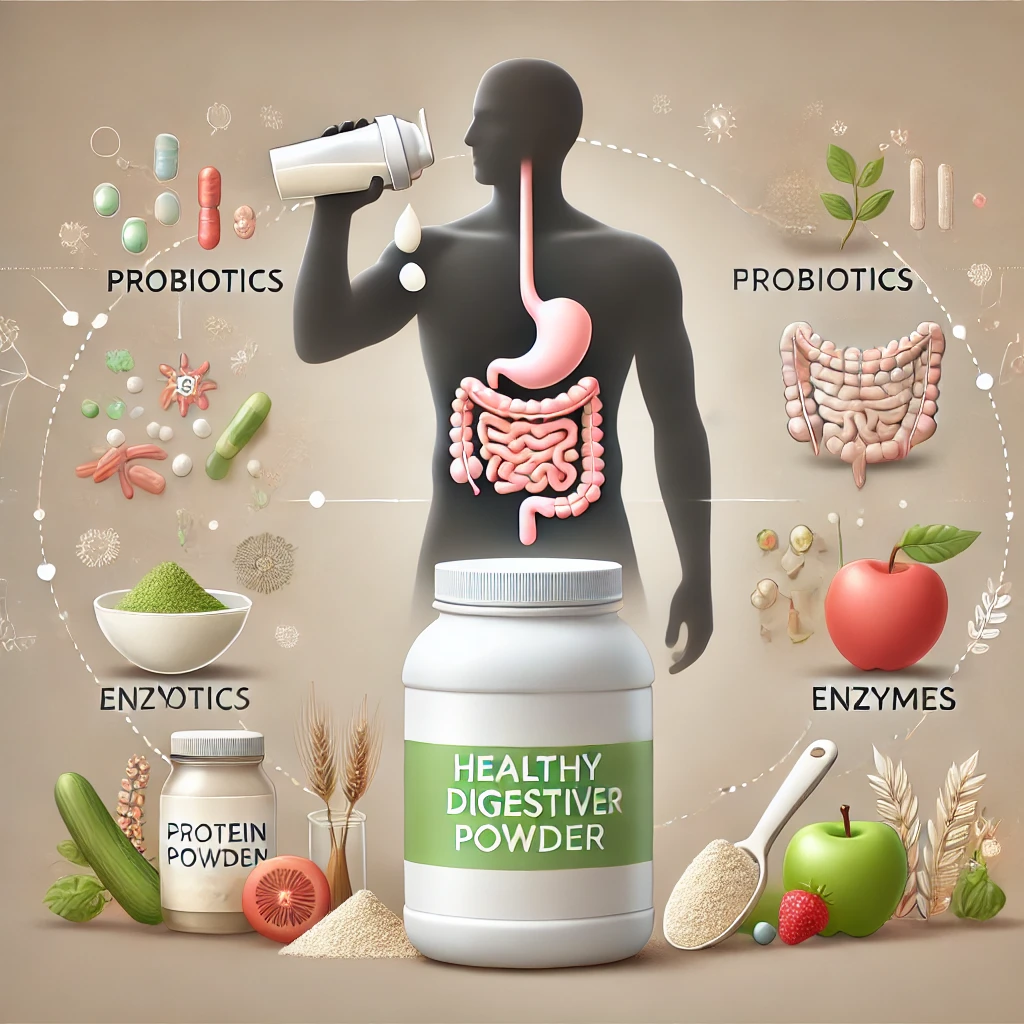Introduction
Protein powders have become a staple for many people seeking a quick and convenient way to meet their nutritional needs. Whether you’re a fitness enthusiast or someone trying to maintain a balanced diet, chances are you’ve considered using protein powder. But beyond muscle building, did you know that protein can also have a powerful impact on mental health? Today, we’re diving into how protein affects your mood, cognitive function, and overall mental well-being.
Table of Contents
Understanding Protein and Its Role in the Body
What Is Protein?
Protein is an essential macronutrient that plays a critical role in almost every aspect of our body. It’s not just about muscles—protein is necessary for building enzymes, hormones, and neurotransmitters. These elements are crucial for keeping our body functioning smoothly, including our brain and mental processes.
Types of Protein Sources: Food vs. Supplements
You can get protein from many sources: meat, fish, eggs, dairy, legumes, and more. In recent years, protein powders have surged in popularity. They’re a convenient way to boost your daily intake without constantly planning high-protein meals. But is there a difference between getting protein from whole foods versus powders, especially when it comes to mental health?
The Rise of Protein Powdesr as a Dietary Supplement
Protein powder is often marketed as a solution for building muscle mass, but it has a lot more to offer. It provides a concentrated source of high-quality protein, which can benefit the brain as much as the body. The question is, how?
The Brain-Protein Connection

How Protein Supports Brain Structure and Function
Your brain is a complex organ that relies heavily on protein for its structure and function. The amino acids found in protein are the raw materials your body uses to create neurotransmitters—chemicals that transmit signals between nerve cells and help regulate mood and cognition.
Neurotransmitters and Their Relationship to Protein
Neurotransmitters like serotonin, dopamine, and norepinephrine are influenced by the amount of protein you consume. For instance, serotonin—a key player in regulating mood and anxiety—is synthesized from tryptophan, an amino acid found in many high-protein foods. Without enough protein, the production of these neurotransmitters can become sluggish, affecting your mental state.
Amino Acids: The Building Blocks of Mental Health
Amino acids are the foundation of protein, and they play an essential role in mental well-being. For example, tyrosine, another amino acid, is needed for dopamine production. Dopamine is often called the “feel-good” neurotransmitter, and it’s involved in motivation and pleasure. By ensuring adequate protein intake, you’re effectively giving your brain the resources it needs to maintain a healthy balance of these critical chemicals.
Protein Powders and Mood Regulation
How Protein Affects Mood Stabilizers Like Serotonin
Serotonin is often known as the happiness hormone, and it depends on adequate protein intake. Tryptophan, a precursor to serotonin, is abundant in protein-rich foods. When you consume protein powder, you’re providing your body with the raw materials to keep serotonin levels stable, which may help manage mood swings and reduce symptoms of depression.
Tryptophan and Its Connection to Feeling Good
Tryptophan is more than just a component of Thanksgiving turkey—it’s crucial for managing mental health. Since tryptophan is a precursor to serotonin, consuming enough of it through protein-rich supplements or foods can help maintain a positive mood, reduce irritability, and even improve sleep quality.
Balancing Hormones Through Protein Intake
Protein helps stabilize blood sugar levels, which directly affects hormone balance. Stable blood sugar means fewer mood swings and less irritability. Regular protein intake can prevent the spikes and drops in energy that lead to feelings of stress or anxiety.
Protein Powder’s Role in Cognitive Function

Enhancing Focus and Concentration
A diet rich in protein can improve focus and concentration. Protein provides amino acids that are critical for synthesizing neurotransmitters like dopamine and norepinephrine, which help you stay alert and focused.
The Impact of Protein Deficiency on Cognitive Abilities
Not getting enough protein can lead to foggy thinking, poor memory, and even anxiety. Protein deficiency means that your brain doesn’t have the tools it needs to work efficiently, leading to a noticeable dip in cognitive abilities.
Protein’s Effect on Learning and Memory
Studies have shown that amino acids like glutamate, derived from protein, play a role in learning and memory formation. Adequate protein intake ensures these amino acids are available, supporting better cognitive performance over time.
The Link Between Protein Powders and Stress Management
Reducing Stress Hormones Through Proper Protein Intake
Protein helps reduce cortisol, the stress hormone. By managing cortisol levels, you’re less likely to experience prolonged feelings of stress, which can have damaging effects on both mental and physical health.
How Protein Can Help Balance Cortisol Levels
Consuming sufficient protein at regular intervals ensures that your body keeps cortisol levels in check, thereby reducing overall stress levels. This balanced approach can have a noticeable effect on how you respond to everyday challenges.
Protein Powders vs. Whole Foods: Which Is Better for Mental Health?
Benefits of Whole Food Proteins
Whole food sources like eggs, chicken, beans, and lentils provide not just protein but also other essential nutrients like vitamins and minerals that contribute to overall health.
When Protein Powder Is a Good Supplement for Mental Well-Being
Protein powder is great for convenience, particularly when you’re on the go or unable to meet your protein needs through food alone. It’s a helpful addition for those with specific health conditions or dietary restrictions.
Balancing Both Sources for Optimal Health
A balance of whole foods and supplements often works best. Using protein powder in conjunction with a nutrient-dense diet can offer both convenience and a comprehensive nutritional profile.
Protein, Sleep, and Mental Clarity

The Role of Protein in Regulating Sleep Cycles
Amino acids like tryptophan, found in protein, are vital for melatonin production, the hormone that regulates sleep. Protein can thus indirectly contribute to better sleep quality, which is key for maintaining good mental health.
How Sleep Quality Affects Mood and Cognitive Performance
Sleep and mental clarity go hand in hand. With enough protein to support sleep-regulating hormones, you can improve not only your mood but also your ability to think clearly and make decisions.
Protein Powder for Evening Relaxation: Myth or Reality?
Some people find that a small protein shake before bed helps them feel relaxed. While this effect can vary, a protein-rich evening snack could stabilize blood sugar levels overnight, promoting better sleep.
Potential Risks of Excessive Protein Consumption
Overconsumption and Its Impact on Mental Health
Too much of anything can be harmful, and protein is no exception. Excessive protein can strain the kidneys, lead to dehydration, and even indirectly impact mental health by causing physical discomfort.
Physical Side Effects and Their Indirect Effect on Mood
Side effects like bloating, dehydration, and other digestive issues can lead to discomfort, making it harder to maintain a positive mood. Moderation is key to avoiding these issues.
Choosing the Right Protein Powders for Mental Health
Types of Protein Powders: Whey, Casein, Plant-Based
There are several types of protein powders—whey, casein, and plant-based options like pea or soy protein. Each has its own benefits, but plant-based options might be preferable for those looking to avoid dairy, which can sometimes cause inflammation or digestive upset.
What to Look for in Protein Powders to Support Mental Well-Being
Look for a protein powders with minimal additives and natural ingredients. Avoid powders with artificial sweeteners or fillers, as these can negatively impact mental health.
Avoiding Additives and Sweeteners That Can Harm Mental Health
Additives like sucralose or excessive sugar can spike energy levels and lead to crashes, negatively impacting your mood and focus. Always choose a clean label when it comes to protein supplements.
Tips for Incorporating Protein Powders for Mental and Cognitive Benefits
Suggested Dosage and Timing
Generally, 20-30 grams per serving is a good starting point. Timing can be flexible—many find that a morning or post-workout shake is ideal for sustaining energy and mood throughout the day.
Combining Protein with Other Nutrients for Enhanced Effects
Protein works well when combined with healthy fats and carbs, creating a balanced meal that supports overall mental clarity and stability.
Real-Life Examples of How Protein Powder Has Helped People
For instance, many people who began incorporating protein powders report fewer sugar cravings and a more balanced mood throughout the day.
The Importance of a Holistic Approach to Mental Health
Protein as a Piece of the Puzzle
Protein is crucial, but it’s just one part of a comprehensive approach to mental health. Diet, exercise, sleep, and emotional well-being all play interconnected roles.
The Role of Exercise, Sleep, and Mindfulness in Combination with Nutrition
Regular exercise and mindfulness practices, combined with a diet rich in protein, can enhance overall mental resilience.
How Other Lifestyle Factors Enhance the Effect of Protein
Good sleep, stress management, and regular social interaction can magnify the positive impact of a protein-rich diet on mental health.
Common Misconceptions About Protein and Mental Health
Debunking Myths About Protein Powder and Mood Swings
Some believe that protein powder causes mood swings, but it’s typically the additives—like sugar or artificial sweeteners—that are the culprits, not the protein itself.
Is Protein Powder a Miracle Cure for Anxiety?
Protein is beneficial, but it’s not a miracle cure. It should be viewed as part of a broader strategy for managing anxiety, alongside other lifestyle adjustments.
Personalizing Your Protein Intake for Mental Health
Considering Individual Differences: Age, Gender, and Lifestyle
Everyone’s protein needs vary. Age, gender, physical activity, and specific health conditions can determine how much protein you need to support mental health.
Consulting a Healthcare Professional
Always consider consulting a healthcare professional before making significant changes to your diet, especially if you have pre-existing health conditions.
Frequently Asked Questions
Can protein powders directly improve my mood?
Protein powder can support mood indirectly by providing the amino acids needed for neurotransmitter production, such as serotonin.
How much protein should I consume for better cognitive function?
A general guideline is around 0.8-1.2 grams of protein per kilogram of body weight, but it may vary based on individual factors.
Are there any specific types of protein powders best for anxiety?
Whey protein, which is rich in tryptophan, may help support serotonin production, which is beneficial for anxiety.
Can protein powders help me sleep better?
Protein powder, especially one rich in tryptophan, can aid in regulating sleep hormones, potentially improving sleep quality.
What are some natural protein sources that help mental health?
Eggs, fish, legumes, and dairy are all rich in protein and support overall mental well-being by providing essential amino acids.
Conclusion
Protein plays a key role in maintaining not only physical health but also mental well-being. From mood regulation to cognitive performance, protein powders can be a valuable addition to your daily routine if used thoughtfully. Remember, while protein is important, a balanced diet and a holistic lifestyle are essential for optimal mental health.









